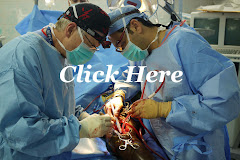The following advice was written by James Price, Orthopaedic surgeon from Dublin, Georgia and is reposted with permission. Not only is the information applicable to many hospitals in Haiti, it is excellent counsel for any orthopaedic surgeon volunteering in a third-world country.
As one who has operated in third world hospitals and makeshift clinics, before and including Haiti- some further advice for first timers- so you will not have to learn the hard way.
1- Do not assume anything. Just because you are going to a "hospital", they may not have anything that you expect them to have. If they have "it" there is an even chance it no longer works as it was old when it was donated several years ago and there was no one there who knew how to fix it when it malfunctioned and no spare parts anyway. If you really need it - bring it with you.
2- You need help from people who live there. They need to arrange the patients to make efficient use of your time there. Contacts with American Missionaries, especially those with medical training, are a great resource.
3- Build relationships with the local docs whenever possible. They can help find the kinds of cases you do and help out with follow up when you leave. The way they treat things may be old fashioned, but may be based on what they have to work with and their training.
4- Leave the hospital or clinic better off than when you came. Remember, their supplies may be very limited. If you use up all the IV fluids showing off your arthroscopy skills, there may not be an IV for the next C-section. Cover the cost of what you use and leave a little extra.
5- Keep it reasonable as far as complicated cases and potential complications. Remember, you are leaving- do not leave a potential disaster. I try to think in terms of something a general practioner would be comfortable following up for me when I leave a post op patient. 6- If you do elective surgery and do have a major complication after you leave, go back and take care of it or at least make arrangements with appropriate local docs.
7- Keep our reputation in mind. American Orthopaedists are held in high regard in many third world countries. We do not want to do anything to change that opinion.
8- Take at least one gallon of Cidex OPA along with a plastic container with a lid. A 20 minute soak of the instruments seems pretty safe. The lid keeps the flys that may be in the OR out of the sterile instrument soak. That helps morale.
9- Learn how to make solutions, re-sterilize gloves and paper gowns. Look over old ways of treating things as it may be the only option you have. Remember pins in plaster, wedging casts, etc?
10- Think about the next guy or gal that will be treating the patient, often without any records. Do not put on a cast if there is no way for the next doc to get it off- use a splint if you can. Take a marker and write on the cast or splint explaining what was done and what is underneath.
11- Take care of yourself- be sure you do not become part of the problem by getting sick or injured. Be sure you should go in the first place.
12- Do not get overwhelmed. You come for the right reasons. You do what you can do and then you go home. You always feel you did not do enough, because of the magnitude of the problem. Go easy on yourself, you have done what very few can or will do.
13- Find out about and follow the rules for that country. Some countries welcome us, some do everything they can to make it difficult. We try to get tempory licenses whenever possible.
14- Do not show up in a disaster area without planning, equipment, local contacts, etc. You will be in the way and part of the problem.
15- Talk to and learn from the people you work with and who set up your OR at home. There is a lot more to it than you think. Even better, take them with you.
16- Take someone with you that is very talented at fixing things if you are not yourself.
17- Take lots of Duct tape, superglue, epoxy putty, plastic sheeting, some tools, hoses, fly swatters, rolls of exam table paper (for the OR table), rubber bands, rubber tubing, more scrub brushes than you think you need, and paper gowns for the patients, earplugs for sleeping.
18- Take cash for things you forgot.
19- Take lots of local anesthetics.
20- Be sure you have arranged good translators.
21- Be willing to teach.
22- Many third world Mission Hospitals are exactly that-Mission as in "Church Missions". Be sensitive to that fact and understand that they may consider themselves first and formost missionaries. We are their guests.
23- Go back and do it again. You will be much better the second time.
24- Thank you for the great efforts put forth by the AAOS membership. Keep it up.






No comments:
Post a Comment